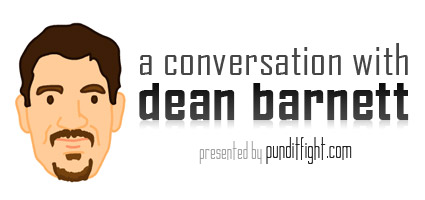
interviews
Dean Barnett
Detail:
An interview with Dean Barnett. Staff writer for 'The Weekly Standard' and occassional fill-in host for Hugh Hewitt's radio program.

>> continued from Part 1
of transcript
I understand you ran for office previously. What position was it for and what type of campaign did you run?
It was 1992, I was 25 years old. Just out of law school, ran for State representative. I ran a cool and noble campaign. Not like this current Presidential campaign. I also lost by a lot. But I also did a lot better than George H Bush who was the head of the Republican ticket that year. I ran as a conservative Republican, it was an interesting scene. Knocked on about 10,000 doors during the course of the campaign. Which was as an experience I won’t forget, talking to a lot of voters during the process. There was lot of work, a lot of competitive work at the time but the further you get away from it the more valuable and the more cherished the memories become.
Being on the other side now as opinion shaper and pundit and having experienced the rigors of a political campaign. Has it made you reevaluate your original post-mortem of your campaign? Has it made you empathetic of Politicians in general?
It didn’t work cause I didn’t have a chance.
I was running in a district where the enrolment was 80% Democrat. It was
also a terrible year for Republicans. I never had a chance but I didn’t
know that at the time. I figured that once they met me they might change
their minds and vote for a Republican. In terms of the perspective it
gives, I was running for State Rep which is a small office. The district
had about 40,000 people. So it was a much smaller thing than running for
congress or running for President.
It gives you some perspective because even at that level the routine becomes
very repetitive. The things you say become very repetitive. Even though
you want a honed, canned message by the time you’re knocking on
the Five thousandth door you pretty much know what you’re gonna
say and you’ve pretty much heard every question people are gonna
come up with 25 times. So I’m kinda sympathetic to the candidates,
why they have this mental exhaustion but I’m also unsympathetic
because this is what they’re doing. This is their job, you gotta
stay sharp and especially at the level they’re playing you gotta
stay really sharp.
You’re a close personal friend of Mitt Romney’s, is that correct?
I’m a friend. I wouldn’t say close personal
friend. That would be overstating it, if you said it it wouldn’t
be entirely true. I was one of the first volunteers going back January
of 1994 and I’ve know him ever since then. Really liked him very
much, admired him very much. I think he’s a terrific guy and a really
really good man. Very smart, very talented, I’ve always said since
I’ve known him in 94’ that if there’s one guy who I
think should be President of the United states, that’s Mitt Romney.
So I was delighted that he actually ran this time and I got to vote for
him.
It seems to me that Mitt Romney and Fred Thompson had the most compelling conservative credentials but there was a disconnect somewhere personality wise.
One of the things that still irks me, is I don’t
think the true Mitt Romney ever really came through to the electorate.
If it did, this is a guy who worked for a big Company. Everybody who worked
with him, everybody that did business with him loved him. Universally
respected, universally liked.
I remember I was in Washington during the Primary season having lunch
with another conservative writer and the name Mitt Romney came up, he’s
question about Mitt Romney was “how come nobody like him”.
The people who know him like him but its true – and I’ve overstated
it a lot – bur Mitt Romney didn’t quite connect with the electorate.
Part of it was Mitt’s an idea guy. Mitt’s not a pound the
lectern kind of guy. He’s an idea guy. He’s a thinker. He’s
not a technocrat in that he’s also warm and outgoing and engaging
guy. He is at his core an idea guy, I think if ran a campaign that communicated
that side of his nature rather than what he did I think it might have
gone differently. I hope he stays involved in public life because he has
a lot of ideas and especially with the economic problems we’re having
right now. He has a lot of ideas that should be heard, it’d be nice
to have someone in politics who understands something about economics.
It was certainly more pronounced in the case of Fred Thompson and we’re seeing the opposite with Palin. Do you think that kind of deficiency in the minds of voters can be overcome.
To use your wrestling analogy, on the one hand you’re
born with what you’re born with. On the other hand there’s
a craft of getting through to people. You look at some wrestlers who get
so much better – look at Hulk Hogan in his initial incarnation didn’t
go over at all. But in his latest incarnation after Rocky III he was the
biggest thing since sliced bread. They can develop their craft to become
better and better. I think the same is true of politicians. They can learn
what works, they can learn what doesn’t work they stay away from
their weaknesses, they can emphasize their strengths. As you point out
there is no substitute for - if you’ve got someone who can deliver
a speech like Barack Obama, if you’ve got someone with the charisma
and personal appeal of Sarah Palin. That’s being born on third base
in a political sense with that kind of talent.
You look at a guy like John McCain who’s gone as far as he has,
which is very far without any of those talents. But there’s a huge
advantage for someone like Obama or Palin actually having those gifts.
McCain has done surprisingly well in this general election. But people might forget McCain is climbing his second mountain. Coming from behind the pack in the Republican primary. What did his victory tell you about the Republican base, the influence of conservative talk and McCain himself.
I’ve always been on record that conservative talk
is – Bill Bennett put it really well one time I was talking to him,
what we do is provide a dial tone. We can bring things to attention but
our listeners by definition are high end news gatherers and they come
to the show with a well defined sense of the world. I’m hosting
the show on Thursday, and Mark Steyn is coming on, if Mark Steyn and I
spent the first 15 minutes telling everybody “you should vote for
Barack Obama”. That wouldn’t swing a single vote to Barrack
Obama’s side.
So our influence is weak, we can shine a light to a story, we can bring
attention to a story. But in terms of persuading our audience, it doesn’t
really work like that. We get credited or blamed depending on how you
look a it to what happened to the immigration bill a year and a half ago,
15 months ago. You know what people, our listeners were against that bill
from the moment it became public. And it wasn’t anything we said.
We just gave voice to that frustration. We allowed people to express that
frustration. We didn’t create it. We didn’t foment it. It
was there and it’s something the Washington establishment just doesn’t
understand. I tell ya if they listened to a lot more talk radio they would
understand it a lot better.
Does that follow that the Republican Base were going to vote for McCain no matter what? That doesn’t sound it either.
Most of what happened in the Republican race is that the
guys who had a chance – there were 3 guys who had a great chance.
One was Romney, one was Giuliani and the other one was Thompson. They
all failed to close the deal and that left McCain and sort of left Huckabee
- but Huckabee wasn’t really able to close the deal outside his
base. So that left McCain as the last man standing.
That’s my assessment of how he got the nomination – he was
the last man standing and the other guys all fell down. If Rudy Giuliani
had gone to Iowa and New Hampshire and explained to a Pro-life party why
they should have supported him he would have been fine. Mitt came closer
than the other ones. If Fred capitalized on his initial momentum he would
have been the nominee. None of them were bale to do that. All of them
developed their own weaknesses, they’re own liabilities and McCain
was the only one left standing.
What does that say about McCain, you make it seem like he just lucked out and lasted the longest?
I don’t want to disparage him, that’s a tremendous
accomplishment to be the last guy standing. It really is a tremendous
accomplishment. One of the great ways he was able to be the last guy standing
is he had a life story and he was a man that many Republicans admired.
That most of the Republican party he was a completely acceptable nominee
and that’s a big thing. If you look at the other guys who I think
are all very good politicians and good men, all of four of them I’m
saying Romney, Huckabee, Thompson and Giuliani are all good men and politicians
but all of them had a big chunk of the party to whom they were unacceptable.
John McCain did not have that and that’s a big deal. John Kerry
was nominated with accomplishing a lot less than John McCain did.
The same question for the General election. What has McCain’s success so far told you about the voting public, the media and McCain himself
This is the one thing I hope the McCain campaign understands, this is a tougher road to hoe than the Primary season was. That he has to make an affirmative case for himself, it’s not like Barack Obama is going to fail to qualify and John McCain will be able to collect those votes as an acceptable alternative. It’s just not going to work like that. Part of the reason it’s not going to work like that is that he’s a Republican in a strongly Democratic year. So he really has to make that affirmative case. On the one hand he can get half way home by taking shots at Obama and bringing Obama down and frankly telling the truth about Obama. As you know I don’t think Obama is at all qualified to be President. So he can go telling those things but to get all the way home he has to get a compelling message of his own out there. That he’s not just going to win this thing because people decide Obama isn’t qualified. So he really has to get the compelling message honed. I don’t think you can say John McCain won the nomination because the Republican Party rallied to his vision. I think you’d be hard pressed to say what that vision was, if you were going to make that case. This is a real tougher assignment and I do think the campaign understands that. I think they are busy on that. This is the time people are just beginning to pay attention and the big first debate coming up Friday. Those are formats where McCain traditionally shines so we’ll see what he can do.
 |
 |
 |